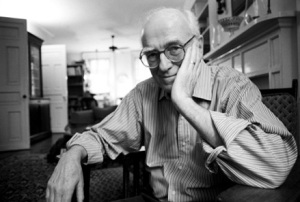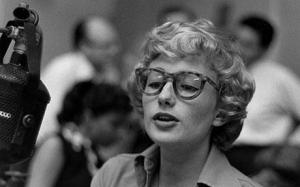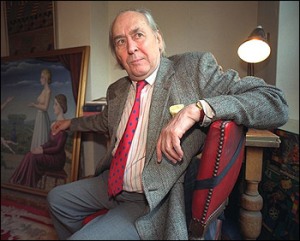Bring Out Your Dead: Donald Westlake, Blossom Dearie, J. G. Ballard
I seemed to have turned a corner somewhere. I can remember a time when it felt like I did nothing but attend weddings. Now it’s funerals. With no belief in the hereafter to gladden my heart, funerals only serve to drive home the message that someone I liked and cared about has been cut out of the world. What’s more, a good memorial service displays every unguessed facet of the departed’s life. The childhood I never saw. The achievements I never heard of. The other friends I never met until now. I’m left with the uncomfortable feeling that I never knew the deceased at all, that I never asked the right questions, that I missed something, and I’ll never find it now.

Donald Westlake
Then there are the deaths I read about. The ones that are not so much a personal loss as a ‘a loss to the jazz world’ or ‘a loss to literature.’ In this respect, the last four months have been pretty bad. Mystery readers lost Donald Westlake (and his evil alter-ego, Richard Stark) on the last day of 2008. I have written about Stark / Westlake previously, and that piece seems a more fitting tribute than anything I could do here. While I never met Westlake or either of the people described below, I mourn their passing in small way.
Blossom Dearie
April 28, 1924 – February 7, 2009
If you’re my age, you’ve heard the voice of Blossom Dearie, whether you know it or not. You heard it every Saturday morning, courtesy of Schoolhouse Rock. Dearie was the voice (and piano) behind “Figure Eight” and “Unpack Your Adjectives.” While Dearie often

Blossom Dearie
asserted that her piano playing was superior to her vocal work, it’s her voice I most enjoy. Girlish almost to the point of squeakiness, but tinged with a humorous cynicism, it brought a breezy sophistication to all of her songs. Her mischievious streak frequently displayed itself in ironic show tunes like “To Keep My Love Alive” or “Always True to You in my Fashion.” Before educating the masses via television, Dearie was a fixture of the late 50’s early 60’s jazz scene. Though she went on to establish her own label, Daffodil Records, the recordings she made in those early years for Norman Granz at Verve (accompanied only by drums and an upright bass) are, in my opinion at least, her best. My Gentelman Friend and Once Upon a Summertime are particular favorites, and either would make a good introduction to her work. Dearie never retired, performing regular gigs in New York and London well into the new millennium. I always hoped I’d be able to see her on stage, some day. I never did.
J. G. Ballard
November 15, 1930 – April 19, 2009
Ballard has been called the inheritor of H. G. Wells, and I can see the similarities. Both were concerned about the impact of technology on human beings, and both were unsympathetically observant of their protagonists’ shortcomings. Still, I can’t help thinking that the oddly prudish Wells (oddly, that is, for an advocate of free love) would have been horrified by the comparison.

J. G. Ballard
Crash, Ballard’s most infamous novel (not to be confused with the tedious Paul Haggis film of 2004) deals with the sexuality of cars and car crashes. Later works explored equally disturbing themes. In both High Rise and Running Wild, homicidal psychosis erupts in posh gated communities. The peaceful bird sanctuary of Rushing to Paradise devolves into a cult. Cocaine Nights and Super-Cannes investigate our psychological needs for crime and violence. Ballard’s last two novels were so controversial that they received no U.S. publication, and I wound up ordering both from overseas. Millennium People details an absurdist terrorist movement among London’s professional class. In Kingdom Come, a postmodern ad campaign turns a suburban shopping mall into a fascist breakaway state.
Although Neil Gaiman recently described Ballard as “terrifyingly normal” in person, his biography is fully as interesting as his books. Born in British controlled Shanghai, Ballard spent part of his childhood in a Japanese internment camp during World War II. Later, he abandoned the study of medicine to join London’s literary avant-garde, editing Ambit, the literary magazine founded by pediatrician Martin Bax. In 1964, Ballard’s wife died unexpectedly of pneumonia (not, as myth and rumor would have it, in a car crash) leaving him to raise three children on his own. His work has been filmed by directors as diverse as Steven Spielberg and David Cronenberg. One final book, an account of his losing battle with cancer, has yet to be published.
In one respect, the deaths of artist are not so final as the deaths of others. The University of Chicago, which began reprinting Westlake’s Parker novels last year, has accelerated its publishing schedule. Two more, The Mourner and The Score, are out already, with an additional four to appear throughout the year. Sadly, Daffodil Records seems to have closed its doors (or at least its Internet portals), but not before reissuing some of Dearie’s back catalog. The Complete Stories of J. G. Ballard, weighing in at twelve hundred pages, is slated for a September release by W. W. Norton. Though none of these people will ever create anything new, there is a lot of their work that I still have yet to enjoy. It’s not what I would choose, if such things were up to me, but it will have to do.
Dave Hurwitz
March 16, 2013 at 8:31 pm
[…] cleverness all his own. Of the fourteen Dormunder novels Westlake worte before his death, I have read the most recent five. All of them were entertaining, light and funny in way Richard […]